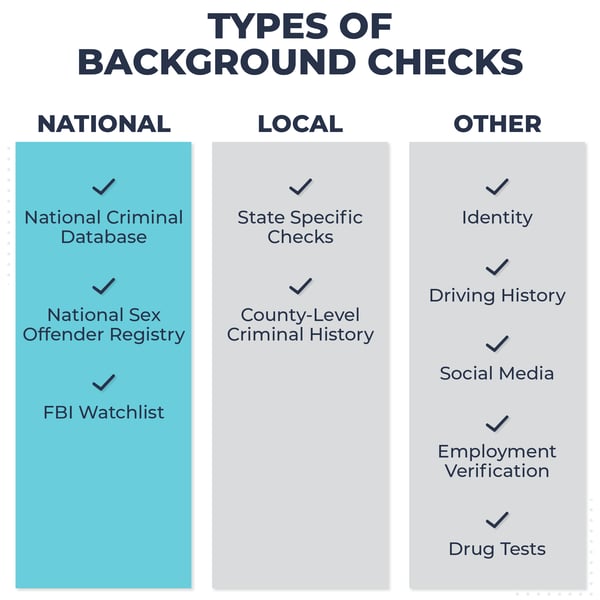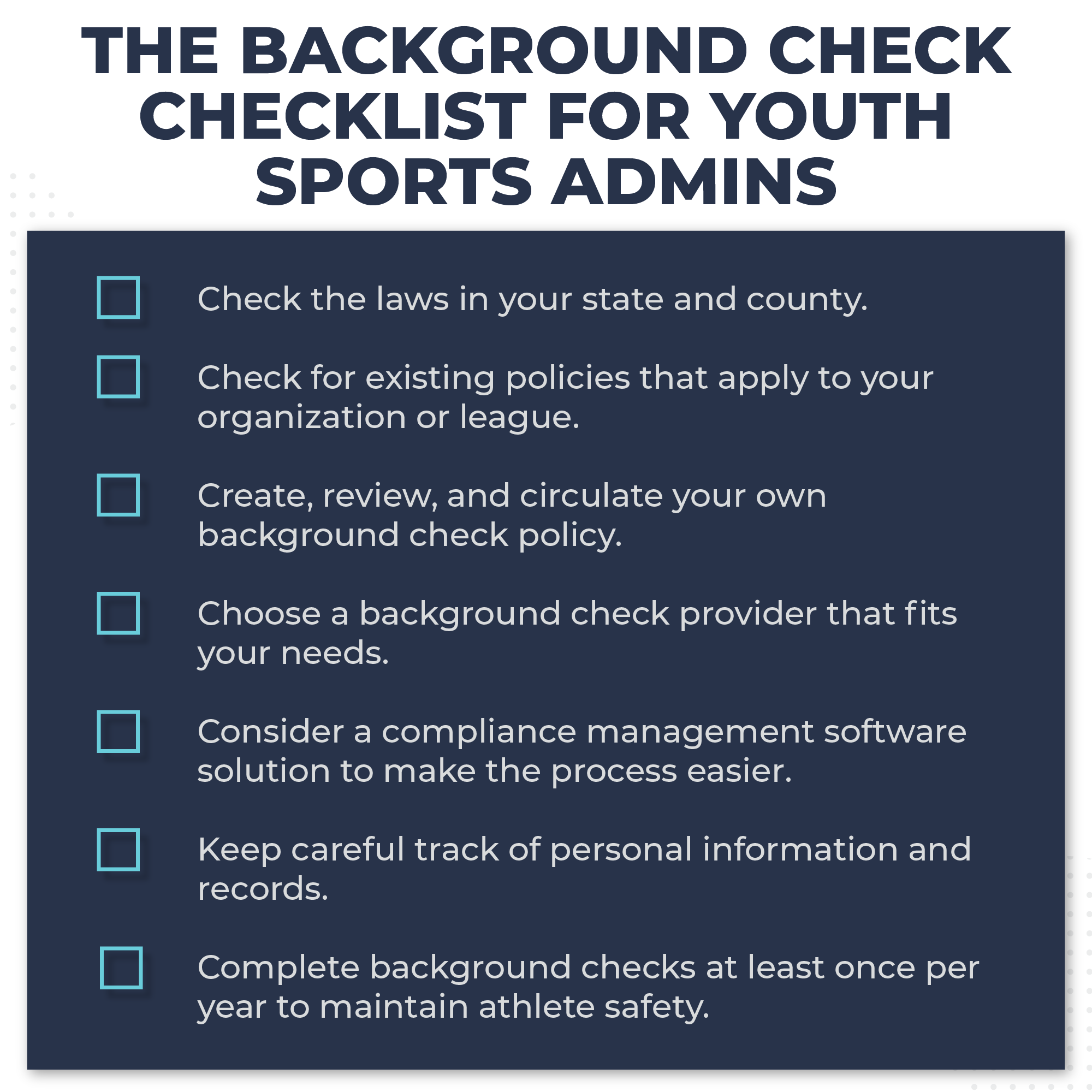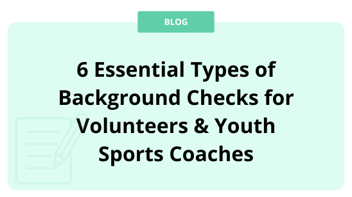The Ultimate Guide to Youth Sports Background Checks
Youth sports background checks are essential. Entrusting your team with an adult who hasn’t had one is like sending a little league batter onto the pitch without a helmet: It puts both the player and the organization at risk.
But background checks—and the laws around them—are confusing. And the whole process can feel overwhelming.
This guide is here to help. In it, we’ll cover:
- Why background checks are critical for youth sports
- Who needs them
- Legal vs policy requirements
- Setting a background check policy
- Types of background checks
- How much it costs to run a background check
- What documentation is required
- Tools you can use to make background checks easier
In short, you’ll find everything you need to know about background checks, so you can stay focused on what matters most: creating a safe environment for your team.
Let’s get started.
Why Background Checks Are Critical for Youth Sports
Youth sports programs aren’t just fun, they’re an integral part of any community. They teach values like trust, teamwork and dedication. They improve cognitive skills, strengthen relationships and help our kids grow up strong and healthy.
But they’re not without risks.
Unfortunately, misconduct and abuse can happen anywhere – even where we least expect it. In fact, statistics suggest that 90% of abuse is by someone a child knows and trusts. And once the damage is done, there’s no going back.
That’s why prevention is so important. Background checks are the first line of defense in abuse prevention as they help to weed out those with a history of abusive behavior and serve as a deterrent to potential predators.
You can think of background checks for youth coaches as protective gear. And not just for the athletes: They’re like the helmets and pads that help protect your organization from legal problems. Without them, your organization could be liable if something goes wrong.
Lastly, having a solid background check policy in place is reassuring for parents and other members of the community. It shows that your organization cares about youth safety and is willing to take tangible steps to make that safety a priority. In short, it provides caregivers and the community peace of mind.

Who Needs to Complete Background Checks for Youth Sports?
So, who needs to complete a background check? To answer this question, it helps to think about it on two levels: a legal level and a policy level.
These two areas won’t always match up. For example, background checks on staff might not be required by state and local law, but they might be required by the league or organization your team is a part of. So, let’s look further at legal requirements vs policy requirements.
Are Background Checks Required for Youth Sports by Law?
We wish there was a simple answer here, but in reality, laws around background checks vary by state.
Some states mandate background checks for staff and volunteers of non-school-associated activities like youth sports. Others do not, so you should always check the legal requirements that apply to your specific state.
This database from ChildCare.gov is a great resource for finding out state requirements. Select your state, then click on the link for Background Check Requirements.
Should You Carry Out Background Checks Even if They’re Not Legally Required?
Absolutely, yes. At a policy level, industry best practice is that anyone who interacts with minors should be subject to regular checks. That includes coaches, referees, staff members and volunteers.
Many youth organizations (like Little League, USA Lacross, USA Gymnastics, Babe Ruth League and others) already have policies in place that make background checks standard procedure.
If you’re not already required to do screenings under such a program, you can (and should) put an organization- or club-level policy in place for thorough background checks, defining who needs to be screened and how often.
Having a comprehensive background check policy has several benefits:
- It lessens confusion around legal requirements, as you’ll be covered regardless.
- It will give you maximum protection against liability.
- The more people your background check policy applies to, the more effective it will be.
- Having a written policy to refer to and stand by will, ultimately, help protect your players and your organization from potential threats.
Setting a Background Check Policy
If you don’t yet have a background check policy in place, setting one up should be your next step.
Here are some of the things your background check policy should cover:
- What types of background checks are required and for whom.
- How often checks will be conducted. Background screening shouldn’t just be performed once, it’s important to establish regular checks.
- How information is gathered and stored. Any personal information you collect should be applied in a confidential, consistent and professional manner.
- What factors are unacceptable and would disqualify someone from working with your organization (for example, conviction of any crime involving children, history of violence, refusal to complete a background check, etc.). This sets clear boundaries that you can apply to everyone equally and lays down your expectations from the get-go.
- What the procedure is in the event that the check uncovers a case or conviction.
- How often your background check policy will be reviewed and updated. It shouldn’t be a set-it-and-forget-it kind of deal: Commit to reviewing the policy regularly (once per year is a good place to start) to ensure it’s doing the best job possible of protecting your team. Regular reviews also help you keep up-to-date with any changes to legal requirements.
If you need help, check out the National Council of Youth Sports Background Screening Guidelines, which act as a guide for any organization that serves youth.
And here are a few examples of how other organizations have set up their background check policies:
- Gold Crown Foundation Background Check Policy
- Hampton, VA, Criminal Background Check Policy for Youth Sports Volunteers
- Valpo Parks Background Check Policy
How Often Should You Run Background Checks?
This comes down to the policy you have in place. At a minimum, any new or returning adults should complete a check at the start of each new season. If your organization doesn’t run activities seasonally, industry best practice is to enforce background checks annually for anyone who needs them.
It’s ultimately up to you if you want to run checks more frequently than that: Running screenings every six months can add an extra level of protection for your athletes.

Types of Background Checks and What Is (and Isn’t) Included in Each Type
There are different types of background checks that apply at the national, state and county levels, and depending on where you are, you may or may not need all of them. Let’s take a look.

National Criminal Background Checks
Nation-wide criminal history checks are essential because they cover all states, not just the one the applicant currently resides in.
Most national background checks will cover these databases:
- National Criminal Database
- National Sex Offender Registry
- FBI watchlist
In other words, you don't have to search each of these databases individually – a single check with a trusted provider should scan all of them.
Along with any prior arrests and convictions, these searches will usually pick up any criminal record charges that are pending, or charges that have been dismissed or acquitted.
State-Level Background Checks
Some states have mandated additional required state checks. For example, Massachusetts has the CORI/SORI Search, Pennsylvania has the PA Child Welfare Clearance and California has a fingerprint check called LiveScan.
Once again, it’s always best to check the laws in your specific state to find out what’s required.
County-Level Background Checks
There are 3,100+ counties in the US, and each one maintains a record of local misdemeanor and felony charges and convictions. Importantly, not all national background checks will pick up up-to-date criminal history records from every county. If there is a hit on a name, the results will only show up if county searches are included in the background check type.
This is why you might want to consider including county-level checks for your youth sports coaches, volunteers and staff—it provides more thorough coverage.
If you’re interested in doing so, make sure you choose a background check provider that includes county searches. And be prepared to pay an additional fee per individual.
Other Types of Background Checks
There are also other types of background checks that may or may not be needed by your organization. These include:
- Identity checks
- Driving history checks (DMV Records Check) for staff or volunteers who will be driving children
- Social media checks
- Employment verification checks
- Drug tests
So, how do you make sure you capture all the right searches with each background check? In the section on tools below, we’ll go over some ways to make this easier.

How Much Do Background Checks Cost?
While most comprehensive background checks cost around $25–$30 per person, those costs can grow depending on your requirements.
For example, county-level search fees can range from $3–$75 per county. And state-specific checks can also incur extra fees.
That’s why it’s important to determine who will pay for background checks. You can pass it on to applicants or have your organization cover the cost. The advantage of the latter is that it removes barriers and gives everyone an equal opportunity to apply as a coach or volunteer.
Regardless of who pays, there are also ways to minimize the costs of background checks. For example, platforms like Ankored carry out background checks in high volumes, keeping prices low. Find out more about how Ankored makes the background check process easier.

How to Run Background Checks
Your first step is choosing a service to run your background checks through. And there are many screening services that cover a range of databases. However, while the pool of databases they tap into is the same, not all background checks will cover all databases.
For example, some providers will only search national databases. Others, like Scout Logic, provide comprehensive searches that cover national, state and county records, as well as sex offender registries and criminal watch lists.
When making that choice, here are some things to consider:
- What’s included and what’s not – for example, are searches of county-level records included?
- How much do they cost?
- What is the turnaround time?
- Is there built-in compliance tracking to help you monitor and organize your compliance activities in one place? When background checks are integrated into a broader compliance system, things run more smoothly and the risk of errors is minimal.
What Documentation Do You Need To Run a Background Check?
To get started on running national background checks, all you need is some basic information from the person and their consent to do the check. Once you have that, you can apply online.
For example, if you want to run a background check using Ankored, you just need the candidate's name, address, social security number and consent. The whole submission process can be done from start to finish in 10 minutes, and managing multiple checks is easy.
Some state-level background checks are more complicated and require the candidate to present in person for fingerprinting. Once again, it’s important to check the laws in your specific state to meet their requirements.
How Long Do Background Checks Take?
Processing times can range from a few hours to three days. It depends on whether you need additional county searches, as these can extend the processing time.
Tools for Making Background Checks Easier
As we said from the start, managing the background check process for your youth sports organization can be confusing, and the last thing you need is to track down multiple sites for results. While that might not be cumbersome if you’re doing one individual check, odds are you’ll have multiple checks to run—and that’s when things can get really messy.
So, here’s some good news.
There are tools out there that can make it easier to manage all your background checks. These can be invaluable to youth sports organizations because they cut down on administrative work while helping you meet your legal and policy requirements.
A compliance system like Ankored will allow you to:
- Search multiple national databases plus county-level records in one place
- Track the status of background checks via an easy-to-use dashboard
- Automate workflows, saving you time
- Assign permissions to trusted people, so you can divide roles and manage your data responsibly
- Tick all the necessary boxes for compliance including background checks, waiver forms and abuse prevention training
A tool that’s been specifically designed to cater to the youth sports industry will help you keep your team safe and your organization protected with minimal fuss and minimal paperwork.

Next Steps
What’s next? Now that we’ve gone over the ins and outs of background checks in youth sports, here are steps you should take to get your organization where it needs to be:
- Check the laws in your state and county.
- Check for existing policies that apply to your organization or league.
- Create, review, and circulate your own background check policy.
- Choose a background check provider that fits your needs.
- Consider a compliance management software solution to make the process easier.
- Keep careful track of personal information and records.
- Complete background checks at least once per year to maintain athlete safety.




